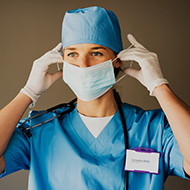
“We’re delighted that the Scottish Government has taken our members’ concerns on board” - BVA
The BVA has welcomed clarification from the Scottish government on its Test and Protect Guidance, specifically concerning the role of Personal Protective Equipment (PPE) and its impact on veterinary practices.
Under the new rules, when PPE has been used in a veterinary setting, contact tracers will undertake individual risk assessments to determine whether the exposure risk is sufficient to require contacts to self-isolate.
It follows concerns raised by the BVA that veterinary practices could be forced to shut down owing to the nature of veterinary work that means veterinary professionals cannot physically distance.
Commenting, BVA Scottish Branch President Kathleen Robertson said: “We’re delighted that the Scottish Government has taken our members’ concerns on board and issued this helpful clarification to reflect the way that veterinary professionals are working during Covid-19 to keep themselves and their clients safe.
“I know that a lot of practices were extremely worried that if a team member was contact-traced it could potentially force the whole practice to shut down for two weeks. This could be really detrimental to animal welfare and make things particularly challenging in remote areas, where there may not be neighbouring practices to call on for support.”
The clarification comes after BVA raised the issue directly with Scottish Government ministers and Scotland’s Chief Veterinary Officers.
A similar move was made by Public Health England earlier this month, whereby contact tracers will carry out individual risk assessments based on PPE and other precautions, should someone working in a veterinary setting be identified as a contact.
Ms Robertson continued: “Veterinary professionals in Scotland should continue to take all precautions to mitigate against the spread of the virus including practising social distancing, washing hands regularly and wearing appropriate PPE.
“It’s fantastic that this guidance has now come into play in England and Scotland. BVA will continue to raise the issue in Wales and Northern Ireland and hope that a similar approach is taken.”
What the new guidance means for veterinary professionals in Scotland:
- members of the veterinary team do not need to wear more PPE than they usually would. It should be based on the practice’s own risk assessments. Full use of PPE is only appropriate in situations where a team member cannot maintain social distancing in their work, such as during dental work or surgery.
- social distancing, hand hygiene and biosecurity are all key aspects of disease control and use of PPE should not be used as a substitute for these measures. Any use of PPE must therefore also be accompanied by ongoing social and physical distancing (as far as possible), hand hygiene, and good biosecurity.
- veterinary professionals should continue to work in dedicated small teams and pairs and practise social and physical distancing as much as possible.
- if a member of the veterinary team is contacted by a contact tracing call handler, they should provide full details about their PPE. The contact tracer should then carry out an individual risk assessment to determine if you are required to self-isolate.



 The Veterinary Medicines Directorate (VMD) is inviting applications from veterinary students to attend a one-week extramural studies (EMS) placement in July 2026.
The Veterinary Medicines Directorate (VMD) is inviting applications from veterinary students to attend a one-week extramural studies (EMS) placement in July 2026.